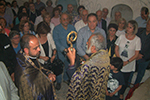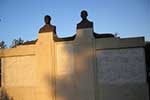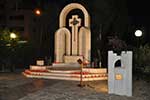Sassounian Column

Israeli Scholar Assails Israel’s: Denial of the Armenian Genocide
An important international symposium on "Armenia-Turkey: How to Normalize Relations," was held in Paris on April 14. It was organized by the French Bureau of the Armenian Cause and the Armenian National Committee of France.
The participants were: Dr. Yair Auron, Professor of History at Open University, Israel; Dr. Israel Charny, Executive Director, Institute on the Holocaust and Genocide, Jerusalem; Ali Ertem, Turkish historian and President of the Association to Combat Genocide, Germany; Dogan Ozguden, Turkish journalist and President of the Foundation "Info-Turk," Belgium; Dr. Alfred de Zayas, Prof. of International Law, Geneva; Dr. Yves Ternon, historian, Paris (by video); Frederic Encel, Political Scientist, Lecturer, Institute of Political Studies of Paris; Giro Manoyan, spokesman of the Armenian Cause office of the ARF Bureau, Armenia; and Harut Sassounian, Publisher of The California Courier, Los Angeles.
Given the recent heated exchanges between Israeli and Turkish officials and the upcoming discussion on the Armenian Genocide in the Knesset on April 28, the audience paid particular attention to Prof. Auron's bold and candid remarks. He has been, for many years, a staunch supporter of the recognition of the Armenian Genocide and a strong critic of its denial by the Israeli government.
Prof. Auron started his presentation by quoting from an article written in 1918 by Shmuel Talkowsky, the secretary of Chaim Weitzmann, who later became the first president of Israel. Talkowsky deplored the "martyrdom" of Armenians and suggested that "a free and happy Armenia, a free and happy Arabia, and a free and happy Jewish Palestine are the three pillars on which will rest the future peace and welfare of the Middle East." Dr. Auron expressed his regret that the policy of the State of Israel today is far from the principles enunciated by Talkowsky in 1918.
Criticizing Israel's opposition to the acknowledgment of the Armenian Genocide, Prof. Auron listed the following specific anti-Armenian actions: "In 1978, a film on the Armenian Quarter in Jerusalem was banned from being screened. In 1982, the Israeli Government intervened in an international Congress on the subject of the Shoah and Genocide, pressing the organizers to eliminate lectures on the Armenian Genocide. In 1989, Israel was involved in preventing mention of the Armenian Genocide in an American calendar. In one way or another, Israel and Jews were involved in the debate in the United States also in 1985, 1987, 1989, 2000, 2007, and 2010. In 1990, the showing of ‘Armenian Journey,' a TV film produced in the U.S., was banned."
Prof. Auron further related that on April 24, 2000, when Yossi Sarid, Israel's Minister of Education, suggested the inclusion of the Armenian Genocide in high school curricula, Israel's government rejected the idea.
A year later, on April 10, 2001, the then Foreign Minister (now President) of Israel Shimon Peres was quoted as stating: "We regret attempts to create a similarity between the Holocaust and the Armenian allegations. Nothing similar to the Holocaust occurred. It is a tragedy, but not a genocide." Reminding his audience that Israel's Ambassador to Armenia Rivka Cohen made similar denialist remarks in February 2002, Prof Auron considered these statements "as Israel's escalation from passive to active denial, from moderate denial to hard-line denial." He said that an Armenian friend "rightly" told him: "I do not know of any enlightened politician in a democratic state that has ever made remarks such as these; you, the Jews, of all people!"
Prof. Auron also spoke about discussions held in the Israeli Parliament on the Armenian Genocide in 2007, 2008, and 2009. Each time, the Israeli government opposed this issue. He expected a similar rejection later this month when the issue is raised in Knesset once again.
Prof. Auron specifically pointed out the double-standard practiced by Israel: "The State of Israel continues to struggle against Holocaust denial on one hand, but participates in the denial of another genocide on the other. This most likely will damage the struggle against Holocaust denial in the future. One might view this attitude as a moral failure. We have to remember that moral claims can have influence only if they are consistent.... Everyone would agree that Israel has no right to bargain with the memory of the Holocaust. But, even more, it has no right - by no means, in any circumstance, and much less so than any other country - to bargain with the memory f another victim group. And yet Israel did just that with the Armenian Genocide. Israel is contributing to the process of genocide denial and by doing so, it also betrays the memory and the legacy of the Holocaust."
The Armenian Genocide has been almost universally acknowledged by dozens of countries, international organizations and prominent scholars. Armenians do not need to beg Israel to recognize it. By denying the Armenian Genocide, Israel morally undermines its own credibility and standing in the world!
By Harut Sassounian
Publisher, The California Courier
«« back ««




















